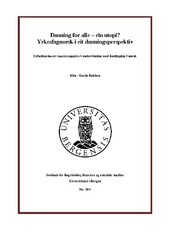Danning for alle – ein utopi? Yrkesfagnorsk i eit danningsperspektiv
Master thesis
Permanent lenke
https://hdl.handle.net/1956/8826Utgivelsesdato
2014-05-15Metadata
Vis full innførselSamlinger
Sammendrag
Through working on the master dissertation ‘Bildung For All – A Utopian Concept?’ The Norwegian Subject within Vocational Studies – in a Context of Bildung. I have aimed to achieve a thorough insight into the conditions for bildung in the Norwegian subject in the vocational education programs. The research is built on the thesis which is following: The condition for bildung in the Norwegian subject in the vocational education programs seems to be poor. In my research I have focused on upper secondary education in Sogn og Fjordane county, where there is a focus on enhancing bildung throughout the period of 2012-2015. This was informed through the current strategy plan for the county. There are several management documents for education that depict that bildung will be a focus. Still there is reason to question if the conditions for enhanced bildung in the Norwegian subject are sufficient. The background for my choice of focus for the master dissertation is that I am uncertain that values tied to bildung has a high priority or is implemented in the Norwegian subject in the vocational education programs. The Norwegian subject in the vocational education programs is challenged from several holds. In Norway it has been decided that partakers in the workforce shall have a determining influence on the design of vocational education in upper secondary education. The challenge is that it is uncertain if all partakers in the workforce acknowledge the value of the Norwegian subject and its distinctive bildung objectives. Both public and private institutions and businesses are today often managed after business economical models. These models seek foremost to reduce costs and boost efficiency. It is uncertain that these goals can be achieved while simultaneously achieving the goal of bildung, which unlike efficiency requires time for afterthought. There are also other conditions that demonstrate that the Norwegian subject in vocational education has a distinct position. It might seem as the Norwegian subject and the students in vocational education are portrayed in a stigmatizing way. The evaluation of ‘Kunnskapsløftet’, the National Curriculum for Knowledge Promotion, demonstrates that the amount of students graduating upper secondary education is low, especially among students in vocational studies. Therefore it was decided that the general subjects in vocational studies were to be focused on work life. In the work on my master dissertation I have focused on bildung in the context of adapting education to work life, fiction literature and conversations. In my research I have used the qualitative research method and I have held individual research interviews. I base my work on individual pilot interviews with four teachers that teach the Norwegian subject in vocational studies, and individual interviews with six teachers that teach the Norwegian subject in two different combined schools, where they teach both vocational studies and general studies. In my master dissertation I have aimed to show several connections and many conditions. Therefore I have based my work on many different sources. Some sources, for example Geir Lippestad, have also aided me in making the thesis current. Otherwise the theory chapters are largely based on litterature by Wolfgang Klafki, Laila Aase, Olga Dysthe, Jon Hellesnes, Inga Bostad and Inge Eidvåg. The chapter on instrumentalism and objectives are, in addition, based on litterature from Alfred Oftedal Telhaug, Petter Aasen and Kjell Arne Røvik. In the chapters on vocational education I have based my work on the litterature of Ivar Bjørndal who describe the history of education. In this chapter texts by Sylvi Penne, and her point of view upon the Norwegian subject in vocational studies have been central. After finishing the work I have concluded that there are segments that enhances the conditions for bildung in the Norwegian subject in vocational studies. However, there are also segments that impair the conditions for bildung in the Norwegian subject in vocational studies.
